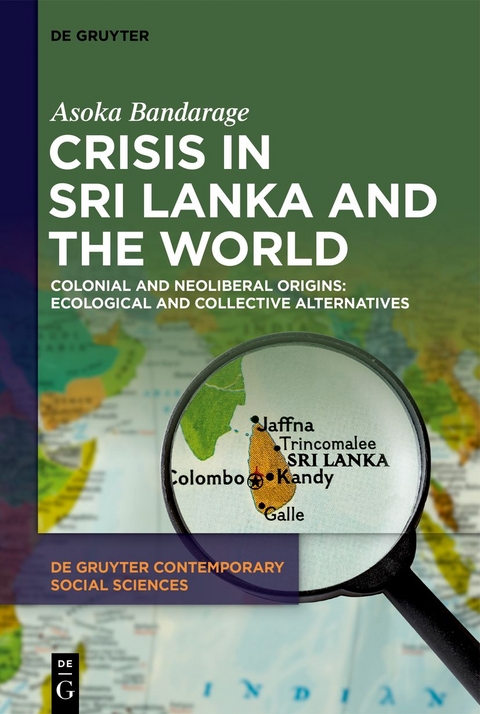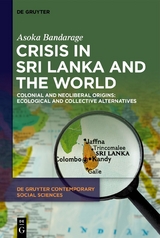Crisis in Sri Lanka and the World
De Gruyter (Verlag)
978-3-11-120343-0 (ISBN)
This book provides a broad picture of Sri Lanka's on-going political and economic crisis as the culmination of several centuries of colonial and neo-colonial developments. The book presents the Sri Lankan crisis as an exemplification of a broader global existential crisis facing more and more debt trapped countries, especially in the post-colonial Global South. The book's in-depth case study raises important questions pertaining to sovereignty and political and economic democracy in Sri Lanka and the world at large.
The book also explores the emergence of the crisis in the context of the accelerating geopolitical conflict between China and the USA in the Indian Ocean. It ponders if the debt crisis, economic collapse and political destabilization in Sri Lanka were intentionally precipitated to the advantage of the Quadrilateral Alliance (USA, India, Australia and Japan).
Moving beyond geopolitical rivalry, the book juxtaposes Sri Lanka's political-economic crisis with the broader ecological crisis of climate change and sea-level rise.
The book concludes with a consideration of the ethical dilemmas behind the debt and survival crisis in Sri Lanka and across the world. It points out a range of social movements and initiatives in Sri Lanka and the Global South which subscribe to collective and ecological alternatives and a Middle Path of sustainability and social justice.
Asoka Bandarage, California Institute for Integral Studies, San Francisco, CA, USA.
"In this well-written, well-researched scholarly text, Asoka Bandarage brilliantly combines a detailed historical analysis of the political and economic crisis in Sri Lanka and a global ethical perspective pertaining to similar crises elsewhere in the world."
T. Lalithasiri Gunaruwan, Professor, Department of Economics, University of Colombo, Sri Lanka
"A very useful analysis providing depth and background to understanding the current Sri Lankan economic crisis. Bandarage goes well beyond the standard tropes of 'policy errors' or culture/identity-based explanations, to locate the Sri Lankan experience in the wider context of profit-, technology- and finance-driven globalization."
Jayati Ghosh, Professor of Economics, University of Massachusetts Amherst, USA
"Crisis in Sri Lanka and the World is a most timely book - and urgently needed for the world that is at a critical crossroads of extreme and accelerating possibilities. For alternatives that are just and sustainable, the crisis needs to be understood both historically as well as in the contemporary context. I cannot think of very many who can do that - both with scholarship and passion - with a fusion of global as well as local and holistic perspectives as Asoka Bandarage has been able to do here."
Sajed Kamal has taught at Boston University, Northeastern University, Antioch New England Graduate School, and Brandeis University
"A powerful, riveting and in-depth analysis of the structural and destructive legacy of colonialism on post-colonial and debt-trapped countries like Sri Lanka ... Dr. Bandarage's superb book is well-researched, expertly synthesized and presented with rigor in an engaging and accessible writing style. It is a tremendous achievement and a must-read for every scholar and student of history, colonialism, underdevelopment, hegemonic domination and ecological disasters. Its cutting-edge scholarship is of critical importance in the fields of economics, political science, environmental studies and policy coordination at the national and international level."
Filomina C. Steady, Professor Emerita, Anthropology and Africana Studies, Wellesley College, USA
"Crisis in Sri Lanka and the World is a valuable addition to any library or private collection concerned with the historical roots and future of the crisis in Sri Lanka and its global implications. In these pages Professor Bandarage writes with urgency and clarity of her nation, its situation in relationship to a history of colonialism, neoliberalism, complex global issues, and climate change. She brings to the table a deep understanding of contemporary international complexities, and the reality of climate change for the world today. Her appeal to a more compassionate understanding of human nature and consciousness itself could not be more timely."
Allan Leslie Combs, Ph.D., Professor Emeritus of Consciousness Studies and Director of the Center for Consciousness Studies, California Institute of Integral Studies
"Bandarage's book ... is a must-read for those seeking alternative methodological stances and more comprehensive perspectives on the analysis of socio-economic crises in emerging economies ... . Crisis in Sri Lanka and the World stands out as a refreshing and much-needed addition to the body of literature addressing the Sri Lankan crisis of the 2020s. It provides a holistic viewpoint, highlighting the multifaceted nature of the crisis and tracing its origins back to Sri Lanka's historical evolution from colonial times. Crisis in Sri Lanka and the World is perhaps the only comprehensive publication written from such a holistic approach so far ... ."
W. D. Lakshman, Professor Emeritus, University of Colombo
"In Crisis in Sri Lanka and the World, Asoka Bandarage provides a profound and compelling analysis of the contemporary dilemma that goes far beyond conventional approaches. Using an in-depth case study of Sri Lanka, the book provides an incisive analysis of the structural and ideological roots of the interrelated global political, economic and existential crisis. It traces the trajectory of colonialism and neoliberalism which has given rise to environmental and social destruction including economic inequality, debt, poverty and political instability in Sri Lanka and the Global South. While delineating the prevailing system of exploitation and destruction, the book brings clarity and direction to the urgency of change. Going beyond a mere critique of capitalism, the book questions the paradigm of domination and the underlying dualism of self versus the other and calls for a shift towards a partnership approach to life which upholds the ethic of interdependence and harmony. This is a very thorough and insightful work of great value internationally to policymakers and activists in the environmental, social justice and peace movements and to all concerned with resolving the survival crisis facing us."
Roberto Savio, Inter Press News Service, World Social Forum, Othernews, University for Peace of the United Nations
"This book provides a deep analysis on present day conditions lining up monetary, economic, political and philosophical issues. It demonstrates that the crisis is not merely economic or one of state administration but a crisis of huma nity. Among other urgent issues, the author discusses the destruction of the environment and resources, the debt burden, the demise of states and historical civilizations and the transformation of humanity itself. A special feature of the book is the presentation of facts with a historical and structural perspective and a vision of alternative values and evolution. This book is a timely contribution which allows not only our country, but intellectuals throughout the world to think again on the path we have travelled and form a new perception on how a better world could be created."
Dr. Liyanage Tudor Weerasinghe, Senior Lecturer in Mass Media, Sri Palee Campus, University of Colombo
"Professor Asoka Bandarage's new book, Crisis in Sri Lanka and the World: Colonial and Neoliberal Origins: Ecological and Collective Alternatives, is a remarkable book inasmuch as she manages to deal honestly and innovatively with local, regional, and international problems and issues simultaneously. Her analysis of the Sri Lankan crisis is set within the context of regional and global issues as well as the historical trajectory from Dutch to British to US and Chinese colonial and neo-colonial experiences. Her investigation of the crisis in this wider perspective shows how truly transnational yet local her analysis and prognoses are. She illustrates how Sri Lanka and the world can learn from past mistakes by taking a total perspective of the problems of post-colonial dominance, corporate hegemony, autocratic corruption, structural inequality, environmental degradation, and debt crises. Her solutions adhere to an already powerful double movement towards participatory democracy, quality of life issues, industry policy, community involvement, and personal development. As part of a wider voice gaining momentum in the global community, her call for a humanistic revival and a global renaissance is to be condoned and supported for us to move from polycrises to a more balanced reality on planet Earth into the hopefully short-term future."
Dr Phil O'Hara, Director of the Global Political Economy Research Unit (GPERU), Perth, Australia, and Past President of the Association for Evolutionary Economics (AFEE)
| Erscheinungsdatum | 10.05.2023 |
|---|---|
| Reihe/Serie | De Gruyter Contemporary Social Sciences ; 30 |
| Zusatzinfo | 20 b/w and 2 col. ill., 14 b/w tbl. |
| Verlagsort | Berlin/Boston |
| Sprache | englisch |
| Maße | 155 x 230 mm |
| Gewicht | 522 g |
| Themenwelt | Sozialwissenschaften ► Politik / Verwaltung ► Europäische / Internationale Politik |
| Sozialwissenschaften ► Politik / Verwaltung ► Staat / Verwaltung | |
| Sozialwissenschaften ► Soziologie ► Mikrosoziologie | |
| Schlagworte | Collective Alternatives • interdependence • Internationale Interdependenz • Internationale Zusammenarbeit • Nachhaltigkeit • Social Justice • Soziale Gerechtigkeit • Sri Lanka • sustainability |
| ISBN-10 | 3-11-120343-3 / 3111203433 |
| ISBN-13 | 978-3-11-120343-0 / 9783111203430 |
| Zustand | Neuware |
| Informationen gemäß Produktsicherheitsverordnung (GPSR) | |
| Haben Sie eine Frage zum Produkt? |
aus dem Bereich




